


This summary for Playoff Game One was written by Eauxps I. Fourgott. Many thanks for volunteering to put this report together! 
If, at the start of this season, you'd shown somebody a picture of the first playoff game's lineup, they probably would have guessed that it was an opening round game instead. This group of leaders was not historically succesful at all; five of them combined for just four playoff appearances and two game wins prior to this season. The only leader with any major previous success was Suryavarman, one of the four seeded leaders remaining in the playoff round; his much better track record and fertile corner start resulted in him being the picking contest's favorite for this match by a large margin. Next to him was the map's only other low peaceweight leader, Montezuma, in the playoffs for the very first time after an unusually successful opening round game. Whether he could repeat that success or would return to his normal patterns of failure would have major implications for how this game would play out. The community wasn't very excited about the rest of this field, all higher-peaceweight leaders who wouldn't declare war at Pleased and rarely accomplished much of note in these games. Would Ramesses, Churchill, Hammurabi, and Joao defy expectations and give us a wild match, or would their relatively passive natures result in a more mundane start to the playoff round?

Right from the start, this game started setting up a showdown between Ramesses and Montezuma. The two leaders started right next to each other, had far different peaceweights, and, as many people had expected, began the game by founding the first two religions, Confucianism for Monty and Judaism for Ramesses. As the game's opening played out, they also proved to have the two best early research rates, thanks in no small part to both being able to develop their capitals well early on. They both had fertile sites for that city and made smart tech choices that allowed them to efficiently improve their territory; Ramesses in particular had a gold resource that was contributing from an early date. As this phase went on, though, it was clear that Ramesses had the edge between the two leaders: Monty sent his initial cities toward the coast, claiming little land, while Ramesses went for aggressive early plants that quickly got cultural control over a wide swath. Monty's second and third cities were also pretty unremarkable, while Ramesses' second was in another juicy region filled with both floodplains and forest, allowing it to contribute economically from an early date while also not being totally hopeless in terms of production. Ramesses also made use of his unique building Obelisks to generate an early Great Prophet and get a shrine up quickly, and he claimed both early copper for military safety and early stone to speed up his inevitable wonder builds. Even as early as Turn 50, this was clearly Ramesses's game to lose - although he did also have the more dangerous central position, and his victory was still far from assured.
The rest of the field was less impressive. Joao was expanding far faster than anybody else, making good use of his Imperialistic trait, but his economy was quite medicore, and as he slowly researched Iron Working to hack down the jungle around him, this expansion was in danger of completely crashing his tech rate. Suryavarman was getting minimal early use from his floodplain-filled land, researching neither Agriculture nor Pottery for the first 40 turns of the game, and avoiding connecting early resources by skipping The Wheel tech for a while and founding all of his cities one tile away from the river that ran through his nation. He also wasn't planting new cities quickly, but he did at least still have a large backline region to expand into, and nobody was pressing on him early on. Churchill had a very slow start, his first city's radius coated in forest and his second city soon losing its valuable gold resource to the Holy City that Ramesses had founded next door. His poor starting techs were also doing him no favors, and with a failed bid at an early religion plus early focus on Archery, he wasn't rectifying that quickly - although the religious bid at least ensured that he'd avoid his usual problem of avoiding culture for ages. Hammurabi had the worst start of all, though, doing overall quite mediocre of a job before losing his second city to the barbarians! He never was able to reclaim that city, Churchill eventually taking it instead, and this setback ensured at an early date that he wouldn't be a frontrunner.
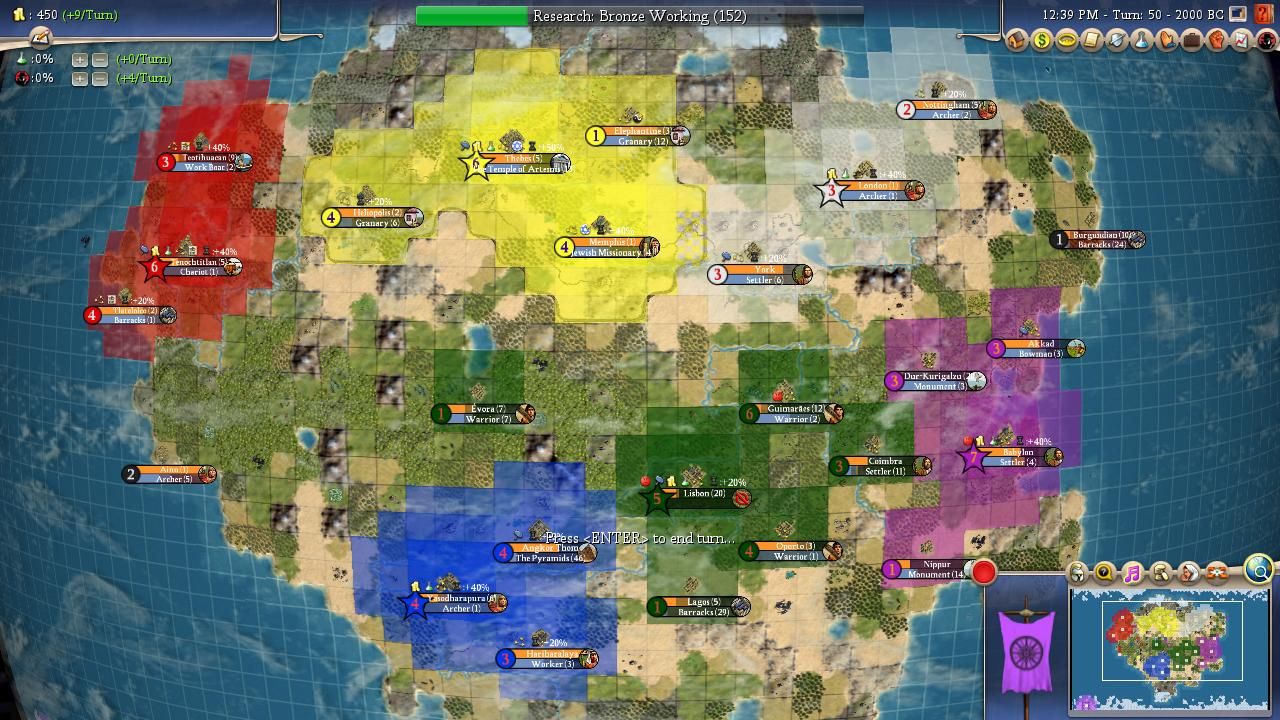
As the landgrab phase continued, the superiority of the four western leaders over the two eastern ones continued to be established. Montezuma, Suryavarman, and Joao were all expanding to good sizes and staying roughly equal on the scoreboard, though Joao was definitely in the shakiest position of the three, with several far-flung, indefensible city plants and a sputtering economy that was without even Pottery or Mysticism for ages. With enough help from Ramesses he could still be competitive for a second place finish, but his early teching had been bad enough to rule out a win already. In the east, Churchill was clearly establishing himself as the stronger partner over Hammurabi, but both of them were clearly a step below the other four. Ramesses was in first place and continuing to build a strong empire, now filling out the remaining space around his starting position while he spread his religion like mad and built almost every wonder available; the only question was if he could hold out once he came under attack. The battle lines for this game were also very clearly drawn early on, as Sury converted to Confucianism while all of the peaceful leaders adopted Judaism. Ramesses' effective spreading of his religion meant that the high peaceweights now had an iron bond, and this match was solidifed as a good-vs.-evil showdown.
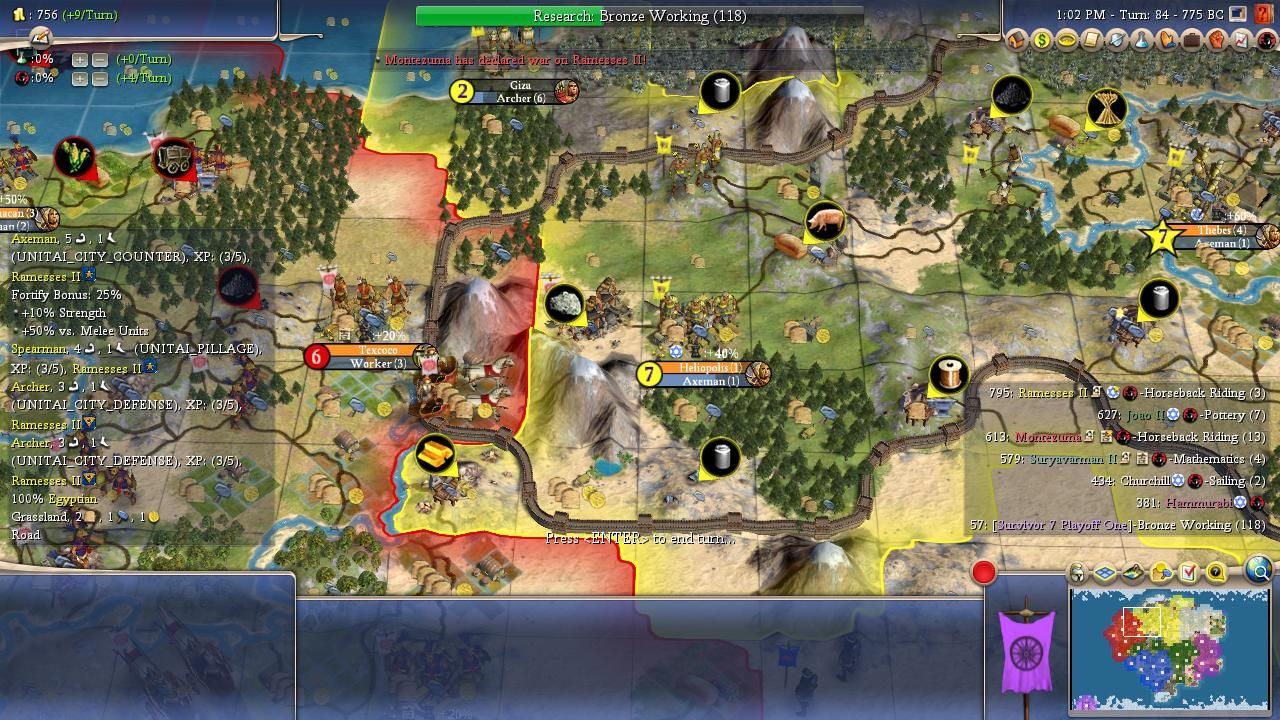
The first war of the game was a surprise to precisely nobody. An eventual conflict between Ramesses and Montezuma had been telegraphed from the opening turns; of course hyperaggressive Monty would launch an attack almost as soon as he was able! It quickly became apparent that this was not to be a productive war for the Aztecs, though. Monty did not have catapults and was not close to having catapults, and while he may have been able to gain ground with a quick strike in the first turn or two of the war, his fairly small stack instead just wandered around Egypt and eventually got picked off. There had been a bit of concern for Ramesses before this war, as his unit production had been fairly low, but as soon as the fighting broke out he started building soldiers in most of his cities to quickly erase that danger. Ramesses was clearly in no trouble here and would have the advantage in an extended conflict due to his superior economy; the only thing at this point that was likely to stop him was a dogpile from Suryavarman. All eyes were now on the Khmer leader, on whom the game likely depended. What would he do?
The answer: Sury stalled. He went to war, but not against Ramesses; instead he went to attack Joao. The resulting conflict was a failure. Joao's territory was wrapped around the Khmer empire, making it impossible to defend everywhere at once, and Sury definitely should have made gains here. However, the Khmer initially attacked without catapults to stall out the initial assault, and then when they were finally getting the upper hand, Sury chose to sign peace instead of pressing his assault, getting all of a single iceball city for his troubles. As a result, Joao was further stalled out, falling to the bottom of the scoreboard, but Sury didn't get any stronger, and none of this had any effect on the Montezuma-Ramesses war. That war continued in stalemate for a long time, neither leader capturing any cities, but Ramesses still clearly had the upper hand. He was quickly clearing out each Aztec stack that came into his territory, and came tantalizingly close a couple of times to capturing an Aztec city and breaking through. He wasn't giving the war his full attention either; he was also continuing to focus on building up his economic and cultural base, taking a break to research the top of the tech tree and build all the wonders found there while emerging none the worse for it. His long-term position was great if he could win this war - but until he broke through against Monty he remained vulnerable. By contrast, Montezuma was still holding out but clearly weakening, his cities starting to suffer from war weariness that was soon enhanced by the Statue of Zeus, and his score dropping lower than anybody else's. There were stirrings elsewhere on the map as well, Sury and Joao and Churchill all beginning to plot new conflicts. No big breakthroughs had been made yet, but the dam was clearly about to burst, one way or another.
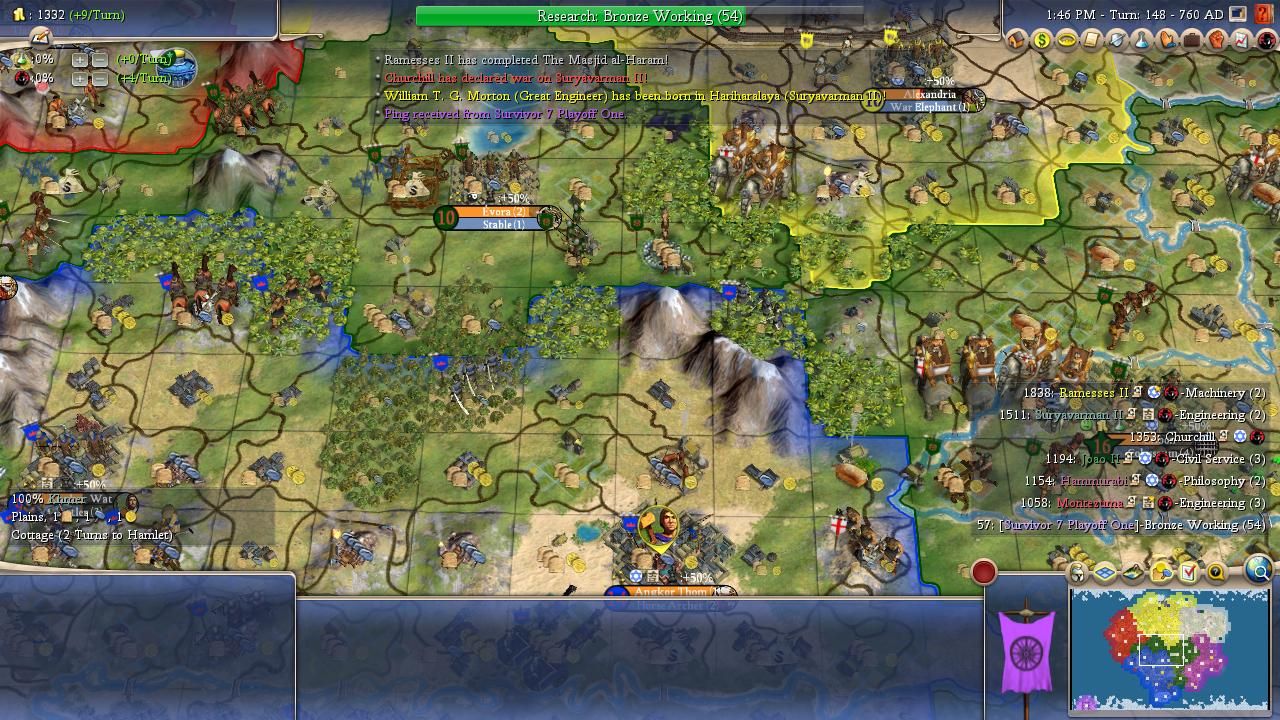
Finally, right around Turn 150, several critical events unfolded. First, Churchill and Joao both declared war on Suryavarman, thus guaranteeing that he would neither be helping against Ramesses nor achieving an easy conquest of one of those two leaders. (Sury had been about to march a stack into Egyptian territory himself, although it will forever be a mystery whether this would have been attacking Ramesses or simply moving through his territory to attack Churchill, whom Sury hated more.) Just a couple of turns later, Ramesses finally broke through, captured, and held an Aztec city, permanently gaining the upper hand over Montezuma. With no danger of a backstab to throw off his plans, Ramesses now had the ball rolling, and started moving from city to city, at last conquering Monty and bringing this war to a close. The Aztec cities did now have castle defenses to draw out the conquest a bit longer, but those could only delay the inevitable, and Ramesses was still able to finish Monty off some 50 turns later, making him the first to die in the playoff round.
After an unusually strong performance in his opener, Montezuma was right back to his old self in this game. Arguably this was even a fairly favorable game for him, since he only ever fought a single opponent - but still, he had a strong opener, got the first strike against a peaceful foe, and saw that foe spend a lot of resources pursuing economic and cultural techs and builds instead of solely focusing on fighting back. And he still lost in a direct conflict. Monty picked a bad fight here, couldn't stop himself from throwing away any potential advantage by attacking pre-Catapults, and without anybody else coming in to save him, he was ultimately doomed. Broader experience from across AI Survivor's history confirms that this and not the Game 7 performance is the norm for Monty; his blind uber-aggression just doesn't work that well, and it's unlikely that we'll see him in the playoffs again anytime soon.
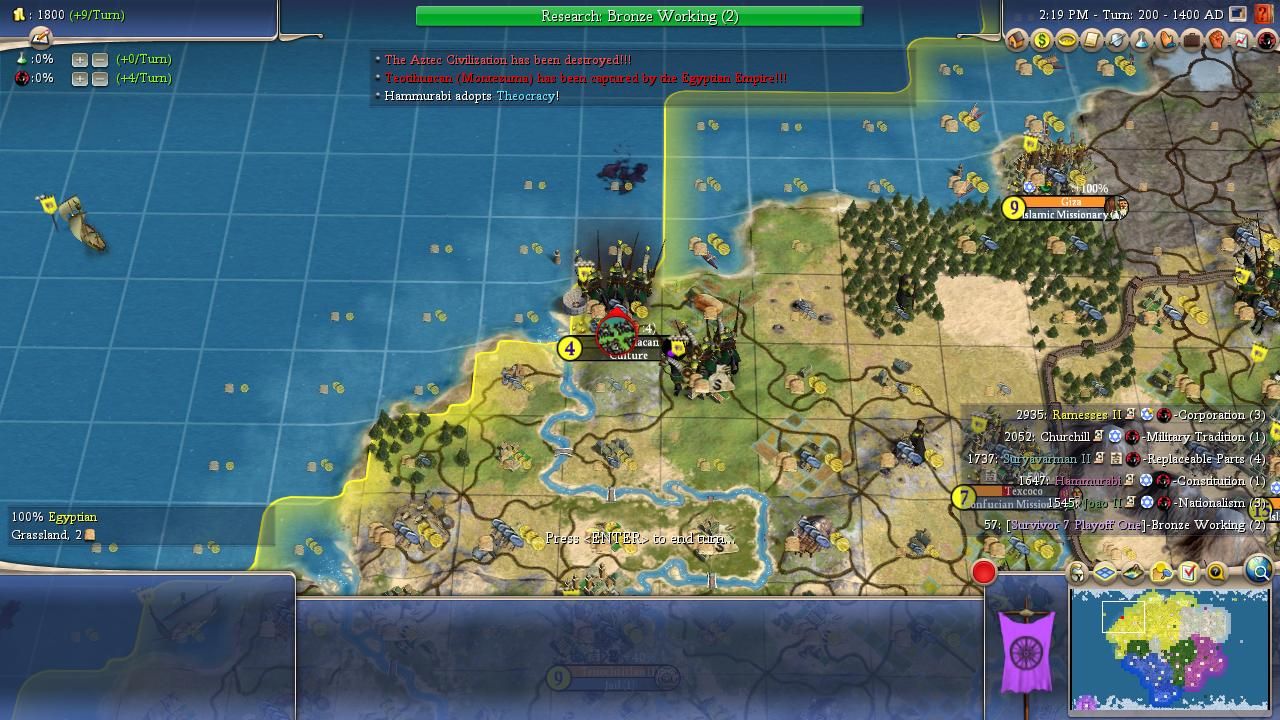
With Monty now consigned to the history books, Ramesses was the frontrunner by a large margin; he had by far the most land, the best tech, almost every wonder, and was virtually guaranteed to win an early Cultural victory. (He now controlled six Holy Cities, which, based on what we have learned about how the AI decides on this victory condition, meant that he was certain to pursue it.) Perhaps he would have been in trouble had Suryvarman warred successfully and become strong - but Sury was instead in bad shape. Early in his two-front war, Churchill had slammed a large stack into one of his core cities without sieging the defenses first, and prevailed through sheer force of numbers. Coupled with the power disadvantage that he faced early in the war, this knocked Sury back and prevented him from making any progress. He signed peace with Joao fairly early, but Churchill continued to press on him, recapturing the one Portuguese city that the Khmer had taken, then taking another core city after a very lengthy siege. Suryavarman was thus on his way out, albeit slowly, and as long as the Jewish coalition remained in place, this status quo would persist - nobody was in any position to shake things up. For his part, Hammurabi had simply been sitting on the cities he'd been able to peacefully settle and quietly teched, not caring to get involved with any other conflicts. It was an characteristically uneventful game from Babylon.
The game thus started going by rather quickly, with little distraction from the main action of Sury getting gradually worn down. He made his best effort at survival by teching Rifling early, briefly halting Churchill's assault, but then both Joao and Hammurabi joined the fight against him, successfully holding him back for the fifteen or so turns it took for Churchill to research Rifling himself and bring redcoats to the fray. Once Churchill was able to mount a full siege with those, he broke through and took Sury's capital, and it was all downhill from there. Churchill was getting most of the spoils, but he badly needed them: he'd been in a strong second place position, but Hammurabi had crept up very close behind him, as Churchill had the unfortunate position of being stuck next to Ramesses' ridiculous cultural machine. All of his border cities were losing all of their tiles and starving down, and so he needed these Khmer conquests to maintain second place. He was able to get them, though; Hammurabi managed to snag three cities, and even rather undeservedly score the kill with a wandering pair of cavalry, but Churchill got all of the rest of the spoils from Sury's demise.
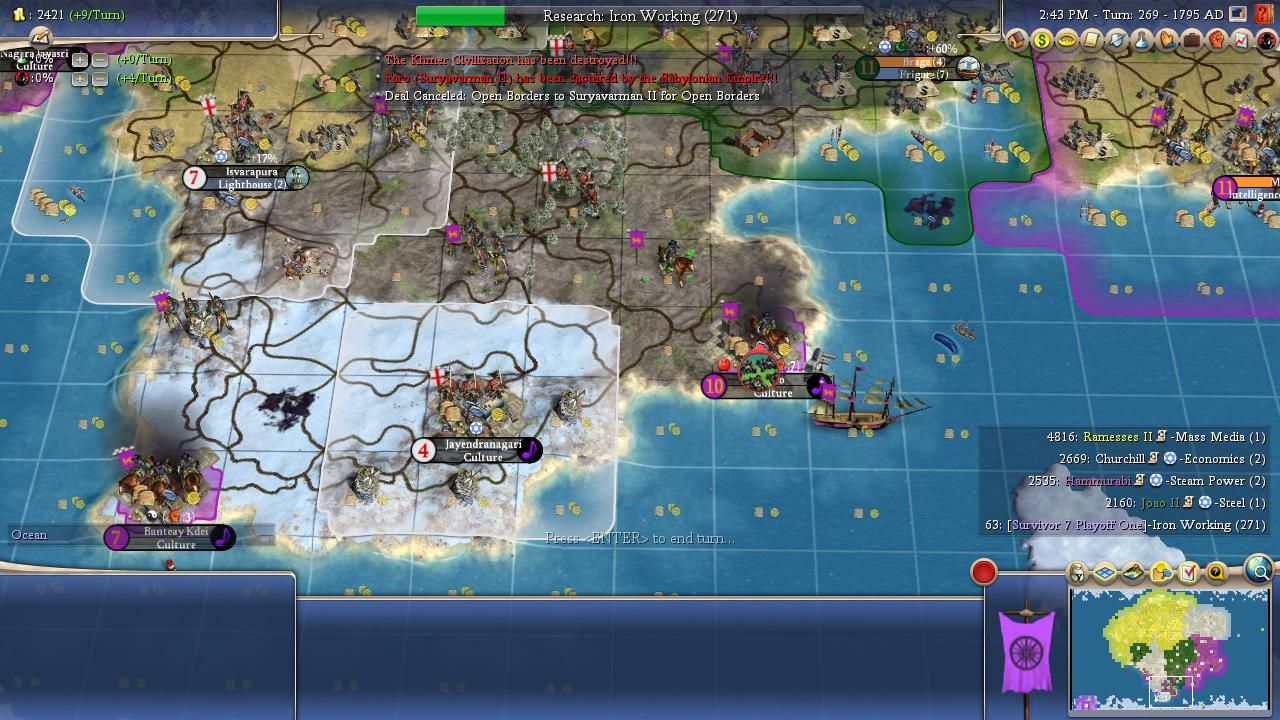
Suryavarman had faced a tough draw here. His play hadn't been bad, he'd had good land around his starting position, and in a situation where he was able to stay at peace or fight in a 1v1 battle, he would have been a shoo-in for a top two spot. Unfortunately for him, he was drawn into the wrong field, one where his only natural ally was Montezuma and everybody else hated him. Even with Ramesses never choosing to get involved, Sury couldn't stand up to constant assaults from Joao and Churchill AND Hammurabi, and so he suffered the death of a thousand cuts. That said, there HAD been a path to victory for him in this game that he'd chosen not to take: if he'd attacked Ramesses early on and made it a 2v1, instead of leaving Monty to fend for himself, that would have opened the door for the two warmongers to run all over the map and he'd likely have won easily. Or if he had pressed his attack on Joao earlier in the game, rather than cash out with a single iceball city, he surely would have made more gains as he clearly had the upper hand, and that likely would have made him strong enough to withstand Churchill's attack and take second place. Sury had a tough start and his play hadn't been bad, but he still could have made it through had it been even better. Instead he is out for the season.
In most games, there would still be a fair amount of action left to go before the ending was decided… but for this particular match, Sury's elimination marked the end of significant events, and the rest of the game would just be Ramesses' march to victory. Even after he went into Free Religion, all four remaining leaders still loved each other; no more wars would be declared. Not that the game would be lasting for that much longer anyway - his getting all but four of the game's wonders, and all but one religion, guaranteed that Ramesses's progress toward a Cultural victory would go very quickly. He barely even had to run the culture slider! Churchill's second place position was also now assured thanks to his Khmer conquests; he'd widened his gap over Hammurabi sufficiently, and was no longer in any danger. This game did have one more last-minute twist arise when Ramesses did the one thing that could possibly stop him from winning now: he built the United Nations. Since he had left the religious bloc in favor of Free Religion some time ago, there was now a very real possibility of the three other leaders banding together, voting Churchill the winner instead of him! However, it was not to be; Churchill wasted the first two votes on the Environmentalism civic (yes, twice), and by the time he did call the victory vote, three turns before Ramesses's victory, Hammurabi had also dropped into Free Religion and so chose to abstain - and his vote WOULD have put Churchill over the top. So Ramesses was the winner after all, cashing in on Turn 300 exactly.
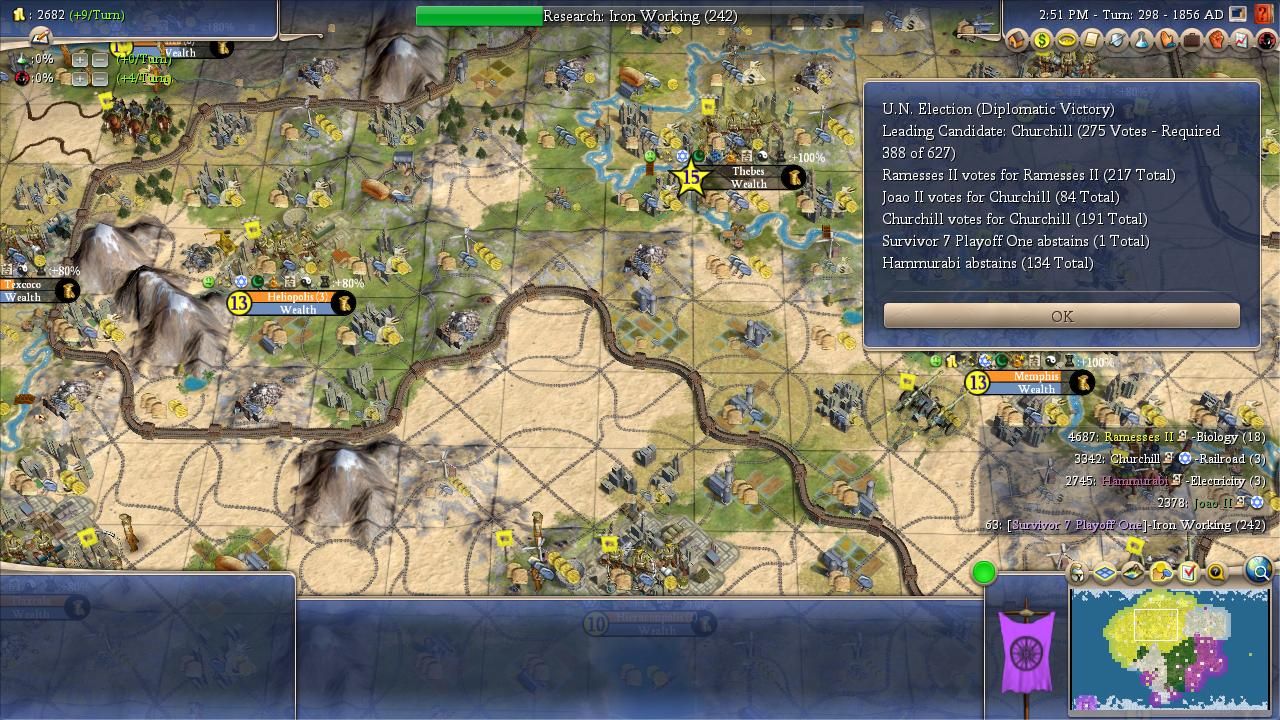
It was an undeniably strong performance from Ramesses for his first career win; he had a strong starting position and favorable diplomacy, but then did a great job at capitalizing on it and not throwing it away. His civ and economy were strong from the game's earliest turns, he made smart research decisions throughout, he solidified his bond with the other high peaceweights by aggressively spreading his religion at an early date, he successfully defended against Montezuma's attack and thoroughly outclassed him in a 1v1 conflict, and he was able to keep a vicegrip over the cultural game while doing so. Of course, in other games, this wartime focus on culture might have proved a fatal weakness, but in this game, he was strong enough to get away with it. After the opening, the only real threat to him was an attack by Suryavarman, and that really would have been an unlikely result; shared Organized Religion civic made Ramesses the high peaceweight that Sury liked the most and they had no border tension. Everything went right for Ramesses in this game and he was able to put on a cultural masterclass as a result; I highly doubt that any of the other three high peaceweights would have won so quickly from this position. Ramesses has clearly earned his first ticket to the Championship, although he'll likely face long odds in the final game itself.
Meanwhile, Churchill was able to cash in on yet another second-place finish for his second Championship appearance in a row. He had a great setup for this particular finish and took advantage; he spent 150 turns building up his civ in safety, then successfully attacked the dogpile target from across the map to claim his silver medal. It was Churchill who did all of the heavy lifting in the war with Suryavarman, and without his intervention the Khmer likely would have won that conflict. He was thus justly rewarded with the lion's share of the spoils, and clearly deserved second place over the other two candidates. That said, he also was very clearly never in a position to actually win the game; this was hardly an amazing performance from him and he hasn't exactly been shattering expectations this season. Churchill's too slow of a starter to contend for the win in most cases, but he clearly has something figured out for second place, as he now holds the longest unbroken streak of such finishes in AI Survivor's history. Will he beat the odds and add on yet one more in the more dangerous Championship game, or will he finally come crashing back down?
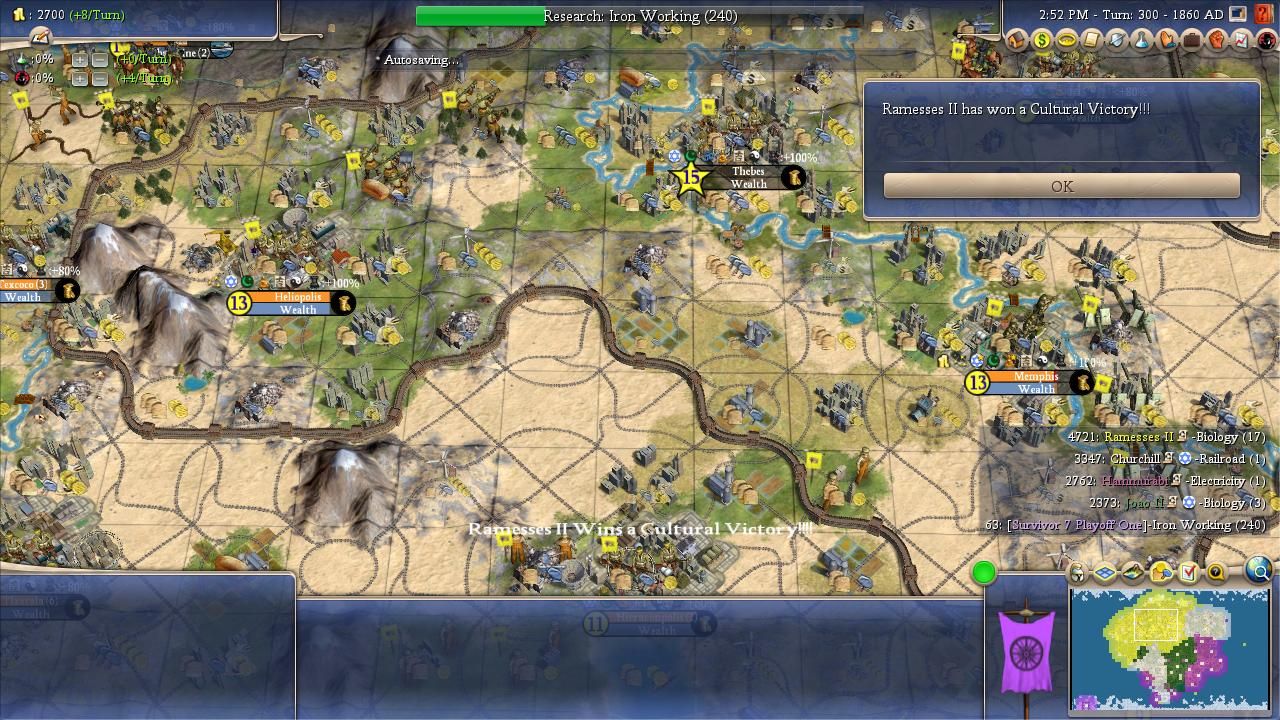
Finally, Joao and Hammurabi survived this game, yet are out of the tournament all the same. Joao tried to replicate his successful opening round performance, but this time he instead knocked himself out of the running through protracted mismanagement of his economy. His land was rough, yes, but he also ignored the chance to get cottages, or culture, in his cities for far longer than needed, and eventually it set him too far back. His pattern of expansion had been suboptimal as well; I think he went for far-flung plants sooner than he needed to, and with more logical expansion he could have ended up with a more coherent, less awkward empire, and been in a better situation to defend against Suryavarman. Maybe it wouldn't have been good enough to win the game, but he could have at least been strong enough to contend for second place. Instead he ended up in an untenable position, and the first conflict he fought set him too far back to really recover. As for Hammurabi, he played the kind of game we've come to expect from him, largely just sitting back in his corner peacefully building and doing little else. He vultured a couple of cities from a dying rival and that was about it - not enough to keep up with Ramesses' cultural machine nor Churchill's conquest of the Khmer. He further dug his own grave by losing a city to the barbarians early on and never getting it back; I think ultimately he wouldn't have advanced either way, but that certainly didn't help matters either. Basically, in this rare playoff appearance, Hammurabi effectively showcased exactly why his playoff appearances are rare.
After the marathon that was the Wildcard game, this match served effectively as a cooldown, our shortest match of the season so far and one with relatively few events - there were only six wars and two peace treaties in the entire contest! With another warmonger-filled game coming next, though, perhaps one nice straightforward contest was just what we needed - and as the person doing the writeups, it is good to have a simple narrative once in a while! Thanks as always for watching and reading.



